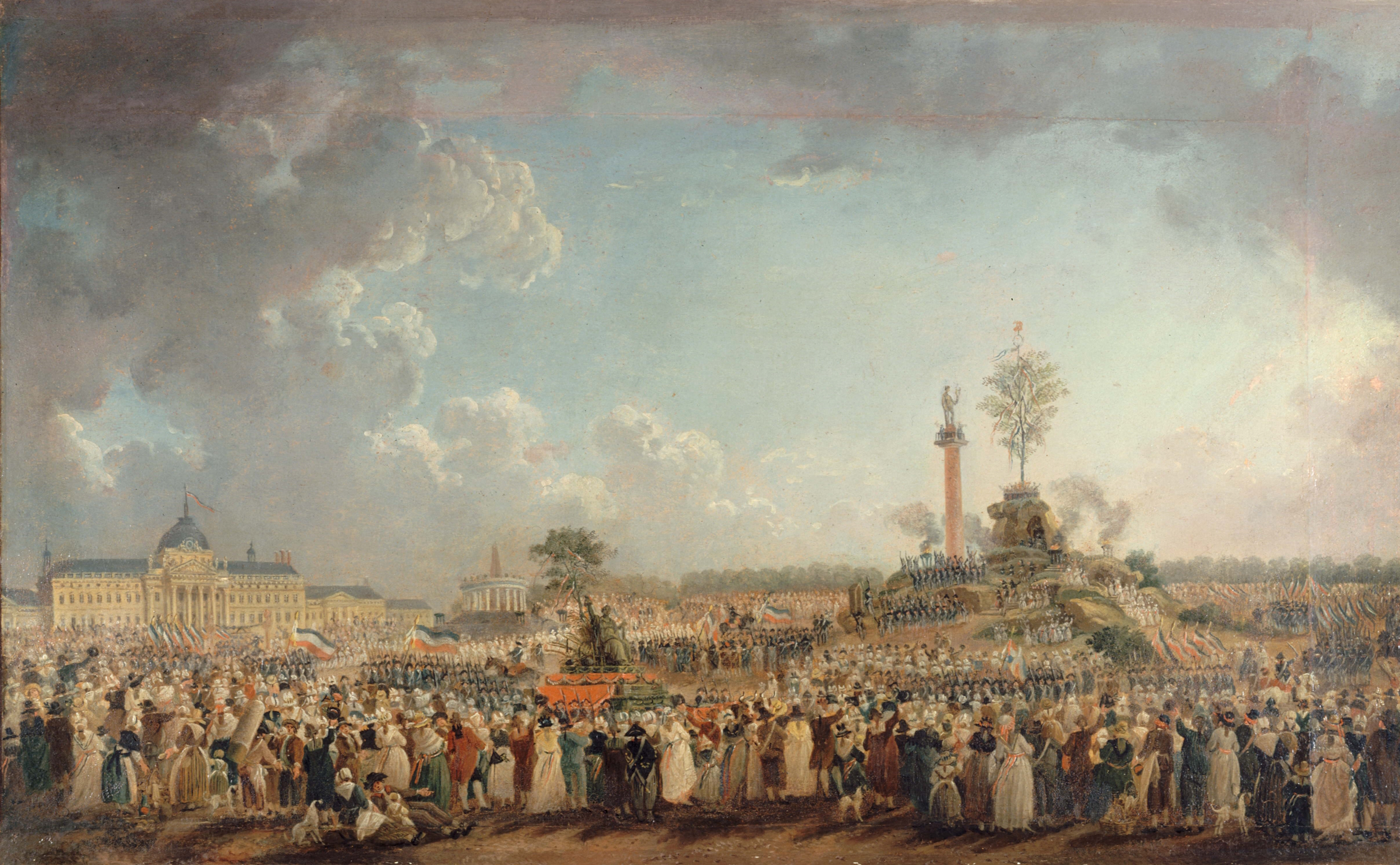
“Gracias quiero dar al divino laberinto de los efectos y de las causas”
Jorge Luis Borges [1]
Revolution, whatever it may be and wherever it appears, is a chimera. It is easy to name, easy to advocate for its arrival, and difficult to know. As Yadh Ben Achour states in his inaugural lecture at the Collège de France, the Revolution is essentially a “hope” [2]. A hope because it is awaited, a hope because it inevitably carries change and aspiration, but also a hope in its unknown, impenetrable aspect. What method can define an event meant to dynamite the course of History and simultaneously render it to a rational order represented by Progress? What method can determine what a Revolution is and should be, as opposed to a simple regime change?
To these questions, it would be easy to respond by legitimizing the ideology that brings the agent of regime change to power. Revolution would thus be simply the event that brings a certain political figure or group to power, implementing ideas never practiced before. The distinction from a simple regime change would come from the rational construction “a posteriori” of the revolutionary moment, seen as driven by the forces of History and crystallizing to give rise to a new world. The problem with analyzing Revolution in this way is that this “a posteriori” construction, in discourse and myth, serves more to justify regime changes in the eyes of the population or international actors than to give true meaning to the word “Revolution.” A revolution could thus be attributed to any different political forces that take power at a given moment and start implementing their program. However, it is clear that Revolutions like the French of 1789, the Russian of 1917, or the Mexican of 1910 are phenomena quite different from all that, involving not only the implementation of a given program by given actors but also a profound change in both consciousness and History. Revolution shapes at least these two elements: the consciousness of the revolutionary subject, who begins to think differently because they are recognized as a citizen or see previously unimaginable political opportunities, and History, for which Revolution becomes a moment of rupture, a key date for decoding its own course. Moreover, Revolution cannot be the mere expression of the political triumph of a given regime, as experiences traditionally considered failures in their time, like the three Revolutions mentioned above, are still seen as such.
These critiques of Revolution as a justification for regime change are necessarily countered by a subjectivist and correlationist argument, which would claim that, in any case, since Revolution pertains only to the subject’s experience of the object, any event perceived by the majority, and ideally by the unanimity of subjects, as Revolution is in fact a Revolution. It would therefore be pointless to set conditions within the definition; it is only about different points of view and methodologies in analyzing social phenomena. Social phenomena must be perceived by society as such, so the idea of Revolution would be just an idea, always constructed “a posteriori.” The attempt to define it would ultimately clash with the subjects’ experience of their perception.
With the use of the word correlationist to characterize this argument, the critique enters the realist theory developed by Quentin Meillassoux, notably in his essay “After Finitude.” In this highly recommended book, Meillassoux questions “the ability of experimental science to produce knowledge of the ancestral,” meaning any reality preceding the appearance of the human species. If everything is merely a correlation between the subject and the object, how is it possible for sciences to formulate in mathematical terms events that occurred before the appearance of the observing subject? There must be a reality outside the subject, a “Great Outdoors,” in Meillassoux’s terms. To critique correlationism, one must seek an existing absolute that can be known, but this cannot be done in the same terms as scholastic thinkers or Modern Times philosophers, who posited God as the absolute. Once passed through the Kantian Enlightenment filter, which, by critiquing pure reason, set the limits of human understanding while confirming it as the epicenter of reflection, positing a given absolute is impossible. What Meillassoux does is posit “the facticity of the correlate as absolute.” The existing absolute thus becomes the subject’s inability to express everything rationally, “to unveil the reason for being of what is.” Once this postulate is admitted, by a series of demonstrations found in Meillassoux’s essay, two consequences can be drawn: “1. A necessary being is impossible 2. The contingency of being is necessary.” If the absolute is understood as the subject’s incapacity to exit to the “Great Outdoors,” then the Great Outdoors, where the principle of necessity no longer applies, paradoxically exists necessarily. But since this Great Outdoors cannot be perceived in its entirety by the subject as necessary, the only necessary element becomes contingency. This leads Meillassoux to two more necessary consequences: “1. A contradictory being is absolutely impossible because a being if it were contradictory, would be necessary 2. There is a thing in itself.” The first thesis is demonstrated by the fact that in the flows of a necessarily contingent chaos, the contradictory being could not exist, as it could not assume the necessary contingency, being able to be and not be at the same time. The contradictory being could thus be both contingent and non-contingent, opening the possibility of a necessary being, which cannot exist due to the absolutization made of the correlate. The second thesis, although much more developed in the essay and in a much more interesting way, is demonstrated by the following argument: if a contingency is necessary and seen as absolute, the inexistence of anything can only be thought of as the inexistence of a thing that exists, thus as the inexistence of a “determined being.” Since it is impossible to think of existence or non-existence in general as contingent, it is only possible to think of given beings as non-existent, which therefore exist and are determined. Meillassoux then continues his reflection on ancestrality and the philosophy of science, but the principle of the necessity of contingency and the demonstration of the two subsequent theses are those that will be of great use.
Returning to Revolution through the speculative realist prism initiated by Meillassoux. Revolution, not only as a social phenomenon but as a being-in-itself, is contingent. It is an event that could happen or not, regardless of social circumstances. The perception of Revolution as inevitable stems only from the absolutization of a certain number of economic and political phenomena. It is merely a mark of the subject’s impotence to think the absolute. A high probability of an event with a certain number of data does not make that event necessary, and this is evident. If a Revolution were to occur under particular circumstances, the principle of reason becomes operative, according to which everything is the rational consequence of something else. But this would mean that the world is a perfect architecture, which makes the Revolution, supposed to represent change, useless and absurd in itself. Revolution will not happen; it may or may not happen, and it is in this that it is a “hope.” This qualification represents not only the contingency of the Revolution in itself but also any theory leading to a Revolution. All this is inscribed in chaos where predictions never have total reliability.
If Revolution may or may not happen, if it can manifest in one way or another, if its manifestation is elusive in its entirety, it is not a matter of falling into a form of relativism or worse, nihilism, when analyzing the concept. It is precisely the opposite. If anything can happen, not everything is equally valuable, and the void is not valuable either. It is then necessary to take up one of the logical consequences of the necessity of contingency, the impossibility of the contradictory being, thus the application of the principle of non-contradiction. If the idea of Revolution can have a meaning compared to a simple regime change, it is precisely by applying this principle. Revolutions, as previously stated, are distinguished not only by the political upheaval they suppose in their context but also by the weight they have in History. However, History, if the necessity of contingency is assumed, is really just a cumulative of contingent events within human societies. The method that allows thinking of History as an autonomous category and Revolutions as upheavals of this History, understood as the long times and phases of human adventure, is the dialectical method. A dialectical method that, on the one hand, does not conflict with the principle of non-contradiction because the contradiction necessary for the dialectic is a contradiction that creates a new concept, a contradiction that surpasses itself, which is not contradictory in itself. A dialectical method that, on the other hand, does not conflict with the contingent nature of everything and the chaotic nature of the world as it assumes itself as a reasoning method within this surrounding contingency. The dialectic thus serves to think of Revolution as transforming the contingent into necessary within History while assuming the necessity of contingency. And this is where speculative realism can contribute something to the way Revolutions are analyzed. These cannot be thought of as mere “a posteriori” rationalizations of a History that does not posit itself as the legitimation of a regime but as that of a universal. Revolutions are the upheavals of Universal History.
But is this universal the same universal at every moment and for everyone? Thinking that the universal, as contingent, is simply the sum of individualities at a given moment, the correlationist trap would still be set, with the chasm of relativism. But this sum of individualities, avoiding the set trap, must be taken itself as an object, not as a whole grouping various individualities. The universality sought by History thought dialectically is the sum of individualities as a sum, thus taking into account all individualities, not as different and equally legitimate interpretations of the world, but as appropriations of a contingent world that must be interpreted by all in application of the principle of non-contradiction. The sum of living individualities is not enough; it is necessary to integrate the dead individualities that allow thinking of History as it is thought today. The Revolution so praised, overturning the existing system in the name of progress, must necessarily take into account the participation of each individuality in the universal and think of itself not as an end but as a method of overturning universal History. A method that takes into account the past as dialectically reasoned and takes into account the individual as the beginning and end, not of everything, but of any interpretation of reality. An interpretation which, if reasonable in the application of non-contradiction, is no less legitimate than that of the revolutionary, both being based on a necessarily contingent reality.
Marcos Bartolomé Terreros
Bibliography :
- Jorge Luis Borges, Otro poema de los Dones in the collection El otro, el mismo, 1964
- Yadh Ben Achour, The Revolution, a Hope, 2021, in https://books.openedition.org/cdf/13252
- Quentin Meillassoux. After the end. An essay on the necessity of contingency. Le Seuil, 2016
Marcos Bartolomé Terreros is a spaniard, born in 2003. He studies the double degree in Spanish and French Law at the Complutense University of Madrid and the University Paris 1 Panthéon-Sorbonne. He is interested in politics, literature and cinema.

